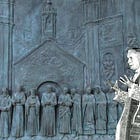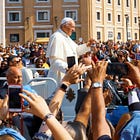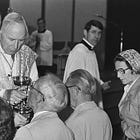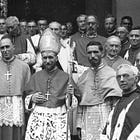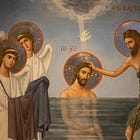Archbishop Lefebvre: Three dispositions needed by priests and seminarians today
Priests and seminarians (and indeed all of us) must have three fundamental dispositions in order to survive in our day. Archbishop Marcel Lefebvre explains what they are:
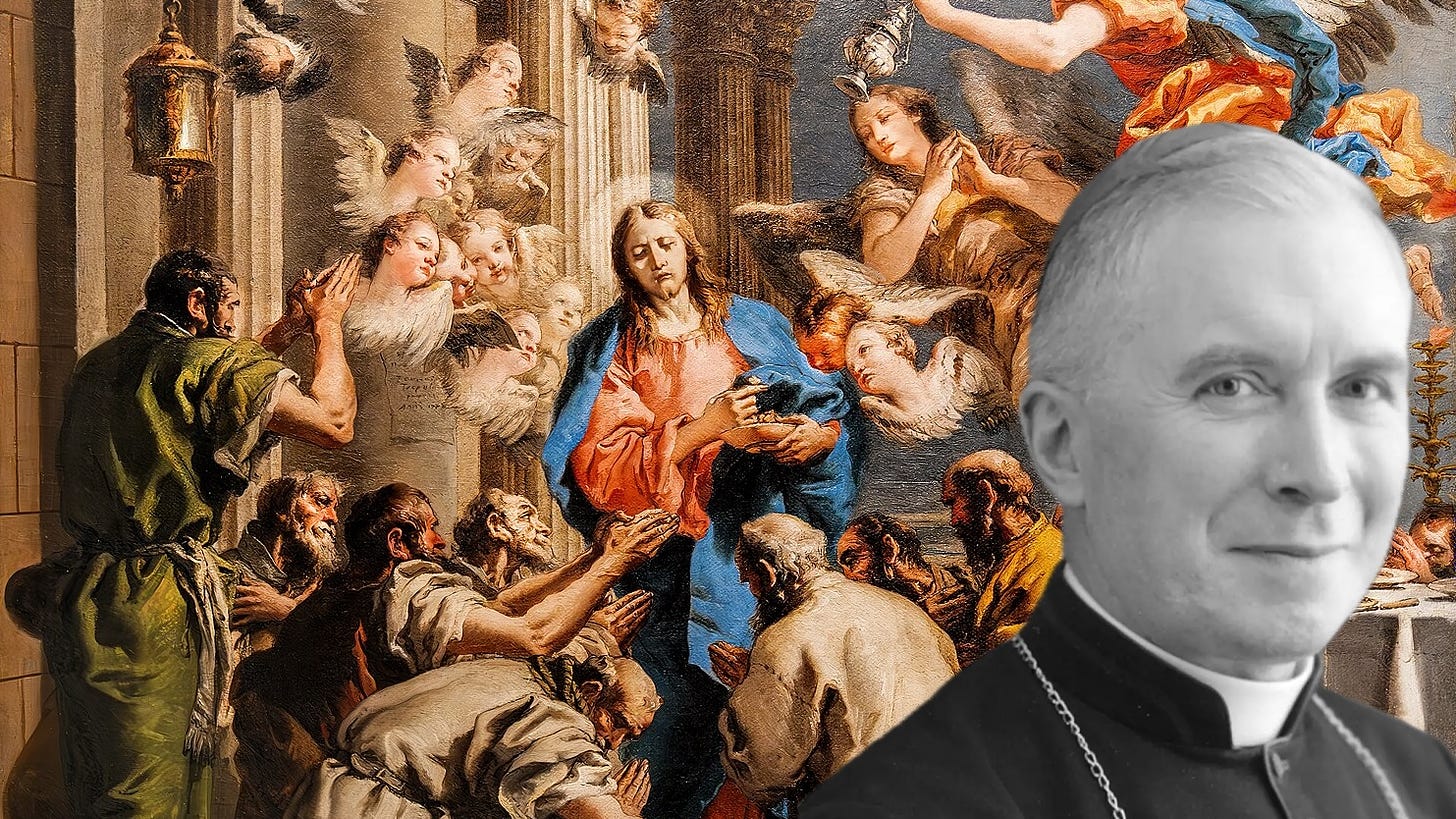
Editors’ Notes
In 1986, during a spiritual conference after Easter, Archbishop Marcel Lefebvre made a striking statement to his listeners.
Some readers will find this statement very surprising indeed.
In fact, it is so striking that it is necessary to provide a significant amount of context first.
Whenever someone refers to something that Archbishop Lefebvre said, the first response from those who disagree is normally, “That’s out of context.”
At the time, the Assisi gathering was on the horizon and ecumenism and inter-religious dialogue/services were multiplying. It is evident that this situation – which has only got worse since 1986 – was at the forefront of the Archbishop’s mind.
In the conference in question, he referred to the sermon he had given on Easter Sunday. He seemed concerned to clarify what he had meant in that sermon, below:
The Easter sermon itself referred to that which he had given on Maundy Thursday at the blessing and consecration of the holy oils, a few days prior.
In the Easter sermon, he seemed concerned at that Maundy Thursday’s sermon (this present article) could be misinterpreted by the seminarians to their family and friends when they returned home for the holidays.
Because of this complex lead-up to the conference – and because of their intrinsic interest – we will be providing English translations of these two sermons, before providing that of the conference in question.
In this first sermon of Maundy Thursday, the Archbishop discusses the dispositions needed by seminarians and priests in our day – and no doubt by laymen as well.
While there may be points of phraseology about the current ecclesiastical situation to which we might object, it remains a useful and edifying sermon in itself, both for the sake of encouraging vocations, and for providing context for the striking statement which we shall reach in due course.
Holy Thursday Sermon
Archbishop Marcel Lefebvre
27 March 1986
My dear friends,
My dear confreres,
My dear brothers,
On this Holy Thursday, the feast of the institution of the priesthood, I will particularly address you, my dear confreres in the priesthood, and you, dear seminarians who are ascending towards the priesthood, and I invite you to meditate particularly on three fundamental dispositions we need, especially in this epoch of the history of the Church, of which we are the servants.
The first disposition: faith.
The second disposition: piety.
The third disposition: the spirit of sacrifice.
The first disposition needed – faith
Faith, my dear friends, you who are priests, who every day offer the Holy Sacrifice of the Mass, your entire life is founded, based on faith. Faith in Our Lord Jesus Christ is truly the foundation of our sanctification, of our holiness: no holiness without faith in Our Lord Jesus Christ. ‘Without faith, it is impossible to please God.’ Sine fide impossibile est placere Deo.
Now, if there is one value, if there is something that today is being questioned and fought against, it is faith. And it is with pain that we observe that the government of the Church, which was founded, constituted by Our Lord Jesus Christ precisely to spread his faith, to disseminate it, to defend it – it is enough to list the various dicasteries that were founded in Rome, that is, the various ministries of the Sovereign Pontiff – to realise that the role of the Church’s government is indeed to propagate the faith through the continuity of the Church's apostolicity, through the Congregation of Bishops, the Congregation of the Clergy, and then the Propaganda – Propagation of the Faith – and the Holy Office, Office of the Inquisition for the defence of the faith.
And one could enumerate all the dicasteries of Rome and one would realise that everything is oriented towards the propagation of faith, towards the dissemination of faith and the defence of faith.
Now, we are obliged to observe today that those who precisely have the responsibility of spreading and defending the faith are striving, on the contrary, to destroy it. We are obliged to observe it. And it is not without reason that Roman congregations such as the Propagation of the Faith and the Holy Office have been – in a way – reduced to nothing, replaced by other organisations.
They have wanted to introduce into the government of the Church, organisations that no longer profess the Catholic faith. This is a great harm to the Church. And we are obliged to observe that this situation in Rome has consequences worldwide. And that now bishops, and many priests, no longer have the Catholic faith.
The examples are innumerable. And every day we learn things, increasingly more astounding, especially concerning ecumenism.
Injunctions to avoid heretics in the New Testament
So we turn to the Gospel. We turn to Saint John, to Saint John in his Letters, in which he is explicit: We must not have contact with the infidel. We must separate ourselves from the infidels. And by telling us this, these texts teach us that as there is only one baptism, there is only one faith and one God.
Saint Paul says it. Read the Epistles of Saint Paul, especially the two Epistles to the Corinthians and the Epistle to the Hebrews. And you will find, with what force, with what energy, with what command, Saint Paul insists to the Corinthians, to his faithful, saying: No mixing with the infidels.
It is not about those who more or less share our faith. That does not exist. There is no less full communion, fuller communion, plenary, very full! That does not exist.
There is faith and there is infidelity. There is a chasm between the two. And those who do not have faith, worship idols – because no longer having Our Lord Jesus Christ truly as God, they do not have the Father either. ‘He who does not have the Son,’ says Saint John, ‘does not have the Father.’ And there is only one God, just as we have only one God and one Lord, by whom we are, writes Saint Paul, and for whom we are.
But if one separates from this Lord, one separates from God. And if one separates from God, one no longer worships God. One worships idols; these are constructions of our mind, imaginary gods who are idols, who are demons. This is what the Gospel explicitly says, this is what Saint Paul explicitly writes.
The visible unity of the Church
They (Saint John and Saint Paul) at least were clear, unequivocal in their affirmations, no possible hesitation. There is no divided Church. A divided Church does not exist, the Church would no longer be if She were divided. There is not a part of the Church among the Protestants and a part of the Church among the Catholics. There is the unique Catholic Church, the only and true Church, the true Temple of God. And as Saint Paul writes: We are the temple of God.
Now, you know well, this is what is commonly taught today in Rome, in the churches, everywhere, in the bishoprics. It seems that the unity of the Church no longer exists, that the Church is divided. And that is why this Secretariat for the Unity of Christians was created in Rome, to find the unity of the Church, which is lost. It has never been lost. The Church would no longer exist, She would no longer be divine, if there were no longer unity in the Church.
So it is in the service of this unity of the Church, in the service of this unique faith, of this unique God, that we have been consecrated in our priesthood. And we must at all costs, defend this fundamental truth of our faith and preach Jesus Christ and Jesus Christ crucified. That is our entire preaching. That is the whole object of our faith. Let us remain faithful to this faith.
And if we want to be faithful to this faith, what effects must it produce in our souls?
The second disposition needed – Piety
Piety. What ultimately is piety? Piety is the perfection of the virtue of justice, and in the virtue of justice, the one that particularly concerns piety, the auxiliary virtue of justice, is religion. So piety is closely connected with the virtue of religion. Let us have religion, my dear confreres, let us love to reread, with attention, with meditation, the magnificent chapters of Saint Thomas Aquinas, on the virtue of religion.
You too, dear seminarians, who were raised in a difficult climate today in your families, in the environments in which you were raised, in which you grew, your piety easily wavering, hesitant, uncertain, many hesitations. No, do not be hesitant. Read, reread, what we must be in relation to God. Religion enlightened by faith describes to us the fundamental bases of what we must be: devotion, adoration, prayer, sacrifice – these are the bases of our virtue, of the virtue of religion, which place us in total dependence on God, in a deep, complete reverence of ourselves, which never moves, which never changes. You are always creatures; we are always creatures; we are always redeemed; we are always baptized.
Therefore, in our souls there are fundamental relations with God, with Our Lord Jesus Christ, which must never change. On which we must never hesitate.
If during our spiritual life, there are some hesitations, some difficulties, some trials, that is natural. The Good Lord wants it for our sanctification. But never, never, never should we doubt or call into question the fundamental principles of our piety, of our holy Religion, of our devotion to God, never!
So be faithful also to this piety, to this love of God. For a faith that does not lead to love, to charity, would be a dead faith. If we love Our Lord Jesus Christ, we love the love made Man, who died on the Cross, for the love of his Father and for the love of souls.
The third disposition needed – the spirit of sacrifice
And finally, the spirit of sacrifice. I would gladly say instead of the spirit of sacrifice, ‘the spirit of crusade.’
The crusader is a sacrificed man. The one who is in combat abandons the impedimenta, everything that can hinder him in his fight. Remember the fight of David and Goliath. They tried to put a heavy and cumbersome armour on David to try to protect him from Goliath's blows. And David said:
"With this armour I can do nothing; I am paralysed. Remove this armour from me. I take my sling and I go to battle. With God's grace, I will have victory."
Well, that is also the disposition we must have in this terrifying crusade. Never in History has there been a crusade like today's.
Everything is united against the faith; everything is united against the Church: enemies from outside, enemies from inside. Everywhere, we are dealing with battles like never before in the history of the Church.
So we must be crusaders. We can no longer be half-priests. We cannot have a hesitant and faltering vocation. To lead this fight, to lead this crusade, we need convinced men; men who have faith, who have charity, who have deep convictions and who are therefore ready to fight and to give everything, to have victory; for the victory of Our Lord Jesus Christ; to contribute to the victory and reign of Our Lord Jesus Christ.
The grace of living in this time
I would say that it is a grace for you, my dear seminarians, you live at a time when you must be heroes or nothing. You have the choice. Either abandon the fight or fight like heroes. You must therefore have the virtues of these heroes. We cannot hesitate. Otherwise, you will be struck down in the first battles, you will not withstand the multiple attacks of the devil. See, see, even within the Society, how the devil tries by all means to divide us, to corrupt us, to diminish our forces by all means. Very cleverly, he constantly creates oppositions, divisions to try to weaken our forces, to weaken our fight, to disunite us and thus gain victory.
If it is true, as Saint Paul says to the Thessalonians, announcing … Saint Paul announces the general apostasy before the arrival of the Antichrist. If it is true that this general apostasy must come, obviously the devil will seem to triumph. For how long? We do not know. But he will have an appearance of victory for some time, while waiting for the Antichrist to come and be worshipped as God, in the temple of God himself (2 Th 2, 3-4).
But the Church has the promises of perpetuity and therefore it cannot disappear. So, we have been called by God to maintain the Catholic faith and to fight this extraordinary battle. Let us pray to God, my dear confreres, my dear friends, let us pray to God to be truly worthy of being called by him for this extraordinary crusade. And let us promise him our unconditional fidelity, fidelity to the faith.
The apparent opposition between authority and faith
Of course, the government of the Church was also founded for the defence of the faith and that – normally – we should be faithful to the government of the Church to help this government of the Church to propagate the faith and to continue the Catholic faith.
But if this government fails in its duty, if this government abandons its function and turns against the faith, what should we do? Remain attached to the government or attached to the faith? We have a choice.
Is it the faith that takes precedence? Or is it the government that takes precedence? We are faced with a dilemma and we are obliged to make a choice.
Now, the government was made for the faith and not the faith for the government; because the faith is Jesus Christ; it is Jesus Christ himself. So we must be attached to Jesus Christ before being attached even to the government of the Church – founded by Jesus Christ no doubt, but not founded to be his enemy! Not to destroy him; not to lead souls towards idols, towards false gods, towards demons.
Note: For a cautious discussion of this treatment of the matter of the obedience due to authority, see below:
So let us be firm in this faith and ask the Virgin Mary, Our Lady of Victories, to give us strength in the fight. To help us win the victory against this assault of hell against Our Lord Jesus Christ, our gentle Saviour.
We will meditate these days on the Passion, the pains, the sufferings, the abandonment of Our Lord Jesus Christ by his apostles – but we will follow and strive with all our soul, to follow the Virgin Mary, Saint John and the holy Women. Not to follow the apostles in their abandonment of Our Lord Jesus Christ, to be truly sons of Jesus and Mary.
In the name of the Father and of the Son and of the Holy Spirit. Amen.
Further Reading
HELP KEEP THE WM REVIEW ONLINE!
As we expand The WM Review we would like to keep providing free articles for everyone. If you have benefitted from our content please do consider supporting us financially.
A subscription from you helps ensure that we can keep writing and sharing free material for all.
Plus, you will get access to our exclusive members-only material!
Thank you!
Follow on Twitter and Telegram:




